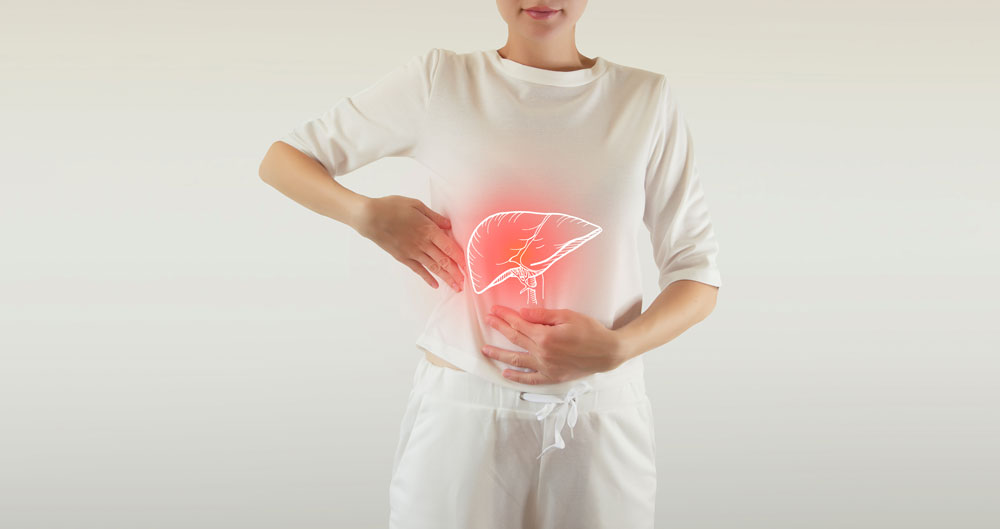Our liver is one of our largest organs. Weighing about three pounds, it is vital for our body’s immune system as well as our metabolic function. It naturally helps detox our bodies by regulating chemical levels in our blood and helps metabolize drugs and nutrients. Our livers also help with certain functions such as converting excess glucose, the production of cholesterol, processing hemoglobin for the use of iron, and determining what nutrients should be processed, stored, or eliminated from our bodies. At any given time, thirteen percent of our body’s blood is contained in our livers. This organ helps our bodies break down harmful substances and eventually flush them out, an essential part of keeping our bodies healthy. Our livers even have the capacity to regenerate. If injured, or if there is tissue removed, our livers can create new cells. If the liver is not functioning properly, it can affect the immune system.
Though there are over 100 types of liver disease, the most common related to autoimmune conditions include Autoimmune Hepatitis, Primary Sclerosing Cholangitis, and Primary Biliary Cholangitis.
Autoimmune Hepatitis
Autoimmune Hepatitis occurs when our body’s immune system attacks our liver cells. This condition can lead to cirrhosis and even liver failure. Causes of autoimmune hepatitis can include genetics and the use of certain medications. Other conditions associated with autoimmune hepatitis include Grave’s Disease, Type I Diabetes, Inflammatory Bowel Disease, and Systemic Lupus Erythematosus.
The most common form of Autoimmune Hepatitis is Type I, which is associated with other autoimmune diseases, unlike Type II, which mostly affects girls between the ages of 2 and 14. Symptoms of Autoimmune Hepatitis can include an enlarged liver, dark urine, jaundice, loss of appetite, nausea, vomiting, joint pain, and abdominal swelling. To diagnose Autoimmune Hepatitis, your doctor may order blood tests or a liver biopsy. Treatment for autoimmune hepatitis is available. Immunosuppressant drugs and corticosteroids can be used to prevent the condition from reoccurring. In very extreme circumstances, a liver transplant may be necessary.
Primary Sclerosing Cholangitis
While there is not an exact cause of Primary Sclerosing Cholangitis, it is thought that it may be related to or triggered by infections or toxins and genetic predispositions. Risk factors for developing this condition include age, gender, location, and those that suffer from inflammatory bowel disease, Crohn’s disease, or ulcerative colitis. Conditions related to Primary Sclerosing Cholangitis are portal hypertension, osteoporosis, and colon cancer. Primary Sclerosing Cholangitis affects your bile ducts, causing them to become inflamed, resulting in scars to form that can block bile. Bile then builds up inside the liver, damaging cells and often resulting in scar tissue being formed. It can eventually lead to cirrhosis and liver failure if not treated. Symptoms of Primary Sclerosing Cholangitis can include jaundice, fatigue, and itchy skin, fever, chills, and abdominal pain. To diagnose Primary Sclerosing Cholangitis, your doctor may order blood tests, a liver biopsy, or imaging tests. Because Primary Sclerosing Cholangitis progresses slowly, it can be difficult to treat. Your doctor may focus on treating the symptoms as well as open blocked ducts. Patients with liver failure may need a liver transplant.
Primary Biliary Cholangitis
Primary Biliary Cholangitis is also a condition related to damaged bile ducts. Bile ducts have the crucial role of carrying bile away from your liver. Bile not only helps your body absorb nutrients but also assists in eliminating things your body doesn’t need. When our bile ducts are damaged, bile stays in your liver which can lead to scarring and inflammation. Primary Biliary Cholangitis can cause liver damage, and in order to prevent the need for a liver transplant, patients will need to work with their doctors to monitor and manage symptoms. The symptoms of Primary Biliary Cholangitis can include abdominal pain, osteoporosis, nausea, loss of appetite, weight loss, dry eyes, dry mouth, jaundice, and leg and ankle swelling. To diagnose this condition, your doctor may order imaging tests, blood tests, or a liver biopsy.
Make an appointment today at Granite State Gastroenterology to manage your Autoimmune Liver Disease.

